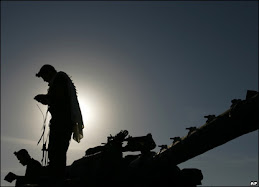Preparing for War with Syria
From Haaretz:
The security cabinet decided Wednesday on the establishment of a ministerial forum, made up of 11 ministers, which would discuss the security threat posed by Syria. This forum will be briefed by the Israel Defense Forces on the army's operational plans to prepare for a possible conflict with Syria.
The security cabinet met Wednesday to hear Military Intelligence assessments on the situation on the Syria front.
The majority MI assessment is that while Syrian President Bashar Assad is well placed to carry out a surprise attack on the Golan Heights, seized during the 1967 Six-Day War, he is unlikely to initiate a conflict.
Housing Minister Meir Sheetrit opposed the formation of the panel, saying that the mere convening of such a panel contradicts the message Israel has been trying to convey to the Syrians, that it is interested in diplomatic negotiations and not in war.
The forum will include the seven officials who had the central roles during the Second Lebanon War in 2006, Prime Minister Ehud Olmert, Defense Minister Amir Peretz, Foreign Minister Tzipi Livni, Industry Trade and Labor Minister Eli Yishai, Vice Premier Shimon Peres, Transportation Minister Shaul Mofaz and Public Security Minister Avi Dichter.
Pensioner Affairs Minister Rafi Eitan, Minister for Strategic Threats Avigdor Lieberman, Justice Minister Daniel Friedmann and Infrastructure Minister Benjamin Ben-Eliezer will also participate in the forum.
At the end of the security cabinet meeting, Olmert said that he has so far not received any invitation to begin diplomatic peace negotiations from Syria, but expressed Israel's desire to conduct such talks. Olmert, answering a question posed by Sheetrit, said he is interested in direct talks with Syria, though in the past the minister have been told that the Syrians demand U.S. mediation.
During the security cabinet meeting, Olmert said that Israel is interested in peace with Syria, not war, and is acting on various diplomatic channels in order to deliver this message to Damascus.
"Israel does not want war with Syria... We must avoid miscalculations that are liable to lead to a security deterioration," Olmert said.
The prime minister imposed a blackout on any further details regarding the meeting, his media adviser said.
Olmert had earlier asked his cabinet to stop making statements on the possibility of a war with Syria, which he said threatened to increase tensions with Israel's north-eastern neighbor.
Speaking ahead of the meeting, Defense Minister Amir Peretz told the local media Wednesday morning that while the Israel Defense Forces was preparing for any scenario, including war, the country must not give up on diplomacy with Damascus.
"The IDF has to be ready on all fronts, irrespective of intelligence reports on what is going to happen," Peretz told Army Radio. "But we have to relay to the Syrians that our exercises and preparations are a matter of course, and in no way reflect plans to attack Syria."
"Israel must probe any possibility of diplomacy with Syria," he told Israel Radio.
"A diplomatic process with Syria can change the situation on three fronts in an immediate and dramatic way," Peretz said, referring to Syria, Lebanon and the Palestinians. "We have to probe every opportunity for real negotiations with them. We cannot give up on this."
Asked if Israel might initiate a war in response to limited action by Syrian-backed Hezbollah guerrillas on the Lebanese border, Peretz told Army Radio that there is no such intention.
The MI assessments to be presented Wednesday show that the Syrian army is deployed along the Golan Heights with strengthened forces, having moved units of large-caliber rockets, similar to the ones Hezbollah launched against Haifa during the Second Lebanon War, up to the front.
The cabinet was also to hear reports on the growing strength of both the Syrian army and Hezbollah. Intelligence reports note that the Syrian army has improved its fortifications and has received modern, Russian-made antitank and anti-aircraft missiles.
The IDF, meanwhile, continued its preparations Tuesday with an attack on, and occupation of, a "Syrian" village during a major exercise in the Negev.
Observing the exercise were Defense Minister Amir Peretz and Chief of Staff Gabi Ashkenazi. Similar exercises in recent years had involved the occupation of "Palestinian" villages.
The structure of the village was similar to the ghost towns on the Syrian side of the Golan Heights, which Military Intelligence maintain are being used by the Syrian army as defensive positions against the possibility of an IDF attack.
"We are preparing for the possibility of deterioration both on the Palestinian front and also, if we have to take action, on the northern front," Ashkenazi said after the exercise.
Israel is concerned that Syria might initiate a surprise attack in an effort to make rapid but limited gains on the Golan. The goal would be to capture a small piece of territory that could serve as a catalyst for a diplomatic process that would result in an Israeli withdrawal from the Golan Heights.
Security sources say there is concern that the Syrian deployments enable the Syrian forces to embark on a sudden, surprise attack. Such action would be accompanied by a massive barrage of rockets from Hezbollah's positions north of the Litani River.
The Israeli concerns have been intensified by the flow of intelligence reports about improved coordination and joint operations among Iran, Syria and Hezbollah.
Commanders from all three forces held joint reconnaissance tours, and their arms procurement is similar, allowing Iran to supply Syria and Hezbollah with munitions and arms in time of war.
For their part, Palestinian militant organizations, such as Hamas and Islamic Jihad, whose leadership is hosted by Syria, are not part of the joint military preparedness of Syria, Iran and Hezbollah, and there is no information involving them in a military operation along the northern border.
The dominant assessment of Military Intelligence, which has been laid out before the political leadership, suggests that in spite the improved capabilities of the Syrian army, and the risk of a sudden attack, Assad does not intend, at this stage, to start a war with Israel.
One of the scenarios that intelligence has put forth is that the Syrians and the Iranians are worried about an American attack on Iranian nuclear facilities, and they are preparing for the possibility of opening a second front against Israel on the Golan Heights and through Hezbollah in Lebanon in retaliation.
On the other hand, a minority view in Military Intelligence argues that the Syrian preparedness, the training and arms buildup signal Assad's readiness to carry out an offensive in a bid to restore the Golan Heights to Syria because Assad is convinced that Israeli public opinion rejects, at this stage, negotiations for a solution.
Senior IDF officers have put forth a third scenario, in which Syria will succeed in forcing Israel to negotiate the return of the Golan Heights, merely through the threat of military action.
*********
Israel gave the world the image that it was weak and without resolve last summer. Syria had built up troops along its border with Israel. Maybe it plans to attacks, maybe not. Nevertheless, if Syria does decide, G-d forbid, to start a war, Israel must make sure that Syria is not the one who finishes it. Israel's retribution should be swift and harsh.

























7 comments:
Good--the sooner the better. Syria is run by a dictator who needs to be taken out.
"...Israel gave the world the image that it was weak and without resolve last summer..." Maybe that is part of the plan. In the new, awesome book "The Nuclear Sphinx of Tehran: Mahmoud Ahmadinejad and the State of Iran" by Yossi Melman and Meir Javedanfar, they claim that the naughty Israelis' destroyed 80% of Hiz'B'Allahs rockets in 90 minutes. Sending a clear message to Hassan Nasrallah that Israeli intelligence has deep sources in HBA.
Democracies tend to learn from war time mistakes, improving and enhancing their performance. Syria could get into a world of hurt very quickly if Bashar initiates any chicanery.
I like your blog!
o.t. - i've blogrolled you at curtains!
You folks are so deep within into your hatred of Muslims that empathy is not an option for you. It is that kind of thinking that perpetuates war.
It is because there are people like you on both sides of the struggle that war continues.
When you lay down your guns and your hate, and those of your type do so on the other side, there will be peace. Unfortunately, there is a very small chance of such a thing happening.
Go through Syria and keep right on moving to Iran. If the US had half the stones she pretends to, we'd be right there to help.
What is it with you folks wanting so much war? If any of you pro-war asshole actually sat down with your enemies and each side discussed their grievances, there would be far less fighting.
If you think that that isn't possible, because "they" are monsters and can't stop fighting, imagine how they think about you.
If you can.
Post a Comment